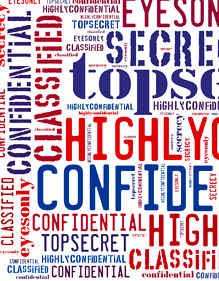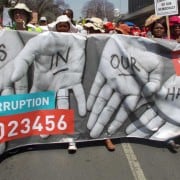|
Getting your Trinity Audio player ready...
|
 South Africa is one of 15 countries featured in a new report from Transparency International UK’s Defence and Security Programme. Titled Classified Information (A review of current legislation across 15 countries & the EU), the report was launched by TI’s Indonesian chapter and is the latest in the global organisation’s Corruption Risks series.
South Africa is one of 15 countries featured in a new report from Transparency International UK’s Defence and Security Programme. Titled Classified Information (A review of current legislation across 15 countries & the EU), the report was launched by TI’s Indonesian chapter and is the latest in the global organisation’s Corruption Risks series.
It deals with the issue of freedom of information and its implications in considerations of national security. At the same time it emphasises that national security shouldn’t depend on high levels of secrecy. Transparency and access to information, and a functional defence and security sector are not mutually exclusive, says TI – because citizens must be able to hold their leaders to account.
The report is released at a time when access to South African documents, classified in the name of security, is in the spotlight – the Arms Procurement Commission, currently in session to probe alleged corruption in the 1999 arms deal, has been widely criticised for, among other irregularities, limiting or denying witnesses’ access to important documents. ”We have seen huge amounts of evidence being kept away from the public, and hostility towards whistleblowers and critics of the deal,” the Right2Know Campaign has said. This situation has led to the withdrawal of key witnesses, potential damage to the commission’s credibility, and doubt that it will achieve its mandate.
Visit the TI Defence website for more information and to download a copy of Classified Information.
A breeding ground for corruption
An environment of little or no transparency can also allow corruption to fester, according to TI, resulting in an adverse knock-on effect on the efficiency of the defence system. “Greater openness can help reduce corruption, which devastates the effectiveness of defence and security establishments,” says TI’s director of the UK defence and security programme, Mark Pyman.
South Africa’s own Information Security Standards note that “security measures are not intended and should not be applied to cover up maladministration, corruption, criminal actions, etc., or to protect individuals or officials involved in such cases”.
However, a report released a few days ago by Right2Know shows that exactly this is happening with increasing frequency in the country.
South Africa not alone
Classified Information supports the Tshwane Principles, known formally as the Global Principles on National Security and the Right to Information. Published in June 2013, this set of global standards provides guidance on a state’s authority to withhold information on national security grounds.
The report also provides examples of good practice which show that openness in this sector is achievable and can yield positive results.
It carries the core message that:
- Most of the 15 countries studied in the review are not doing enough to effectively allow for public access to information related to national security;
- Saying “it’s national security-related” is no longer an excuse for blanket secrecy. There is guidance for governments (such as the Tshwane Principles) and good practice examples (Mexico, New Zealand) that show that it is possible to strike the right balance, and keep the public both safe and informed.
- Secrecy leads to corruption; transparency allows it to be uncovered. This sector is no exception, though measures should be taken to ensure that national security-related information that is justifiably kept secret is.
- Secrecy and corruption leads to diminished public trust – it’s therefore in the interest of the government to be more open.
TI’s research of the relevant legislation in the 16 regimes has led it to conclude that South Africa is not the only country that struggles with this fine balancing act.
The report makes numerous recommendations that can help prevent corruption and malfeasance, while maintaining a culture of transparency:
- information must only be classified when the public interest in withholding it outweighs public interest in disclosing it;
- it must not be classified indefinitely;
- classification decisions must be justified in writing;
- internal and independent external reviews should be part of the legislation;
- information should be properly archived;
- and civil society should be engaged both in the regulation of this field and in the oversight of classification.
Few countries studied met these standards, says TI.









